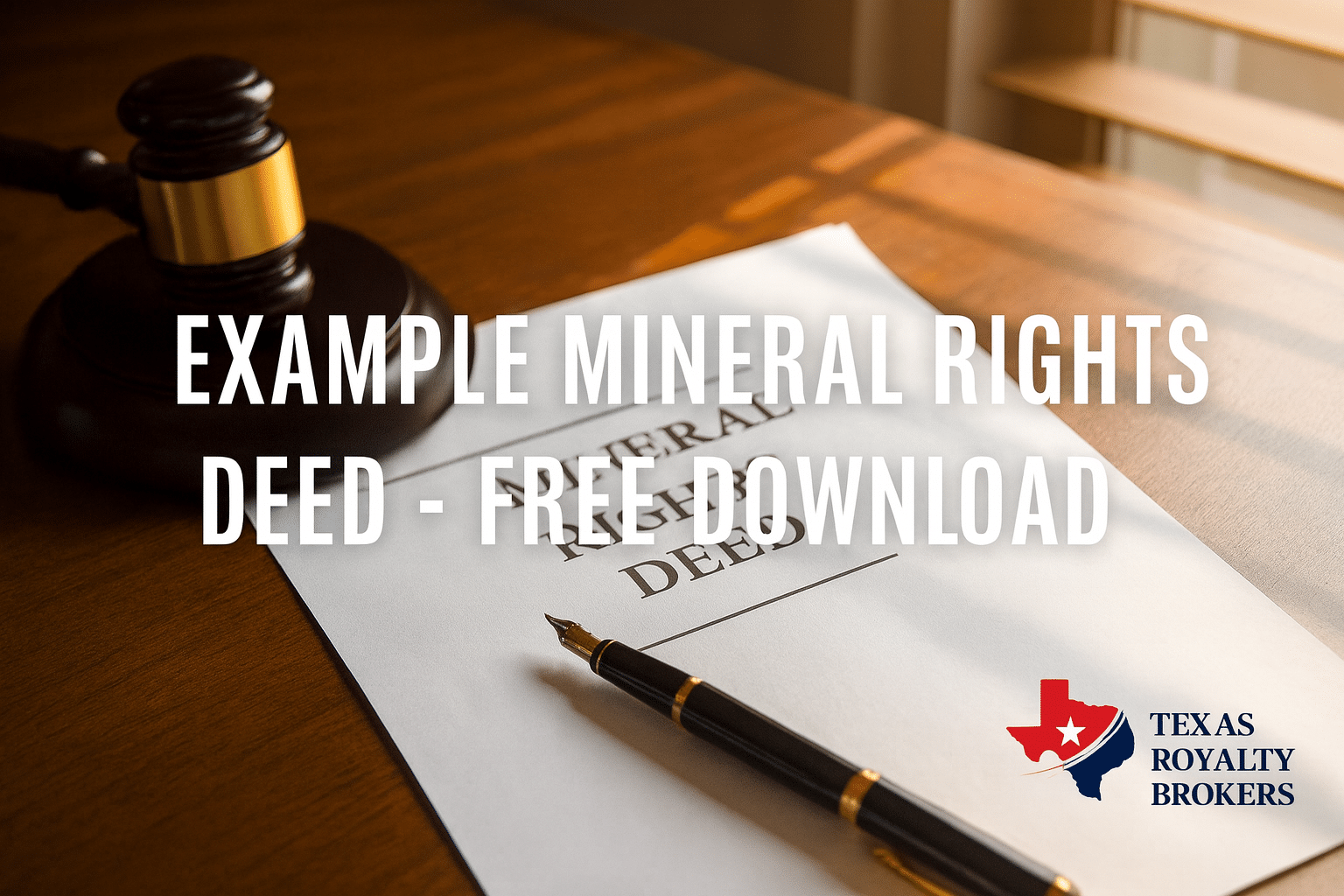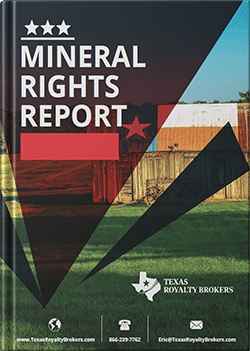Why Texas Royalty Brokers?
sellers
Buyers
State Specific Guides
Resources
Oil and Gas Mineral Rights Deed
What exactly is an oil and gas mineral rights deed?
If you own mineral rights or you’re thinking about selling them, you’ve probably come across the term “mineral rights deed.” But what exactly does that mean?
A mineral rights deed is a legal document that transfers ownership of oil and gas mineral rights from one party to another. It’s the paperwork that makes everything official. Without it, there’s no legal proof that you actually own the rights or that someone else owns them after a sale or inheritance.
This is different from a surface rights deed, which covers the land on top. In many cases, people own the surface but not the minerals underneath, or they inherit mineral rights without owning the land. That’s why understanding what’s in a mineral deed is so important. If you’re not careful, you could accidentally give up more than you intended or miss out on valuable royalties.
In this article, we’ll walk through the different types of mineral rights deeds, the key clauses to watch for, and how to avoid common mistakes. And if you’re thinking about selling, we’ll explain why working with a mineral rights broker like Texas Royalty Brokers can help you get the best price without all the stress.
Let’s get started.
Surface Rights Deed vs. Mineral Rights Deed
When it comes to property ownership, what’s above ground and what’s below it are often treated as two separate things. That’s where the difference between surface rights and mineral rights comes in.
Surface rights give you ownership and control over the land at ground level. That means you can farm it, build on it, live on it, or use it in just about any legal way. But owning the surface doesn’t always mean you own what lies beneath it.
Mineral rights refer to the ownership of the resources under the surface, such as oil, gas, coal, and other valuable minerals. If you own mineral rights, you have the right to sell, lease, or develop those minerals, even if you don’t own the surface.
In Texas and other oil-producing states, it’s very common for mineral rights and surface rights to be separated. This is called “severed rights,” and it means that one person might own the land while someone else owns the minerals underneath it. This setup is perfectly legal, but it can create confusion if you’re not familiar with how it works.
Tip: Watch Out for Deeds That Include Surface Rights
One of the biggest mistakes mineral owners make is signing a deed that accidentally includes the surface rights. This often happens when the legal language in the deed is unclear or overly broad. Some buyers might even try to include the surface on purpose if they think the seller isn’t paying close attention.
If you’re only trying to sell your mineral rights, make sure the deed clearly states that the surface is excluded. Once a deed is signed and recorded, the transfer is permanent. You could lose the land above the minerals without even realizing it until it’s too late.
This is exactly why having a trusted mineral rights broker like Texas Royalty Brokers in your corner can make a big difference. We review all documents and make sure your surface rights stay protected throughout the entire process. As always, hiring an attorney to look is also advised.
Example Mineral Rights Deed – Free Download
Do you want to download a free mineral deed? You can use the link below to download a free mineral deed. This mineral deed is provided for reference only.
Note that the mineral deed download provided is just for reference. The mineral deed that was provided to you will look generally similar, but it may be slightly different.
Types of Mineral Rights Deeds
Not all mineral rights deeds are the same. There are a few different types, and each one offers a different level of protection for the buyer or the seller. If you’re transferring mineral rights, understanding the type of deed being used is just as important as what’s written inside it.
Here are the most common types of deeds used in mineral rights transactions:
General Warranty Deed
A General Warranty Deed gives the buyer the most protection. When you sign this kind of deed, you are guaranteeing that you fully own the mineral rights and that no one else has any claims to them. That includes anything from the past, present, or future.
If a title issue comes up later, the buyer can come back to you for compensation. These are usually used when the ownership history is clean and the seller feels confident that everything is in good shape.
Note: This is uncommon in a mineral rights sale.
Special Warranty Deed
A Special Warranty Deed is similar but comes with a more limited guarantee. In this case, you are only promising that nothing went wrong with the title while you owned the mineral rights. You are not making any promises about what happened before you got them.
This is a good option if you are unsure about the full history of the mineral rights but know there were no problems during your time as the owner.
Note: This is common in a mineral rights sale.
Quitclaim Deed
A Quitclaim Deed is the simplest and riskiest option. It doesn’t offer any guarantees at all. You are basically saying, “Whatever interest I may have, I’m giving it to you.” If it turns out you didn’t actually own anything, the buyer gets nothing and has no legal recourse.
These are typically used in transfers between family members or to clear up minor issues, but they are not a good choice for serious mineral rights sales.
Mineral Deed
A Mineral Deed is used specifically to transfer oil and gas mineral rights. It can follow the format of a general warranty deed, a special warranty deed, or a quitclaim deed, but it is focused solely on the mineral interest.
A proper mineral deed should include details like the legal description, the specific mineral interest being transferred, and any depth or acreage limitations. This is the most common type of deed used when someone sells mineral rights for cash.
Note: You can have a mineral deed that includes a special warranty. This is normal.
Final Thoughts
Each of these deed types serves a purpose, but they are not interchangeable. Using the wrong one or signing without understanding what it means can lead to major problems down the road.
This is why mineral owners trust Texas Royalty Brokers. We walk you through the entire process, help you understand the paperwork, and make sure the correct deed is used for your specific situation. You get peace of mind and a better sale outcome without the guesswork.
Important Mineral Rights Deed Terms
Use the mineral deed download we provided to follow along. We have highlighted the text that needs to be changed. We will walk you through the deed from start to finish pointing out important things to look out for.
After Recording: This text at the top simply tells the county recorder where to return the mineral rights deed after it has been filed with the county clerk. This should be the buyer’s information as the final recorded mineral rights deed will be returned to the buyer.
Special Warranty: The type of warranty you are providing when you selling mineral rights is at the top of the deed. Ideally, you want a special warranty deed. A special warranty means you are going to warranty title during the time you owned it and not before. This important because it means you are only responsible for anything you did to cloud title while you owned it. A full warranty means you could be responsible for taxes a prior owner owed, etc..
Effective Date: Note that the effective date is the 1st day of the month in the month prior to when the royalty deed was signed. This is normal. Your royalty income is paid out on a lag. By putting the effective date a little early, this simply removes the question as to whether the buyer gets royalties going forward based on production month or check date. It’s industry practice that once the buyer completes the purchase, they get all royalties going forward and you keep all royalty checks received prior to closing.
$10 and other good and valuable consideration: When you sign the royalty deed, the purchase price is not public. To hide the purchase price, the buyer will place a default dollar amount here, typically $10. This does not mean that you only received $10 for selling. You receive the amount agreed to in the PSA (purchase and sale agreement) that you sign with a buyer. The PSA is an extremely important document. This document defines how you get paid at closing, adjustments, etc. When you list mineral rights at Texas Royalty Brokers, we walk you through the PSA and the mineral deed.
Legal Description: The legal description is important. You should make sure the deed is conveying only what you intend to convey. When you list mineral rights for sale at Texas Royalty Brokers, we help walk you through this as well to make sure it’s correct.
County Wide Conveyance: Generally speaking, you do not want a county wide conveyance. This means you’re giving up all mineral rights in a very wide area. You want a deed that is restricted to specifically what you want to sell. In some cases, like when you have multiple small pieces of ownership, you might prefer a county wide conveyance so nothing is missed and you can get rid of everything and not be left with some fractionalized ownership.
The rest of the deed is generally standard. However, the language will vary a bit from one deed to the next. If you intend to sell only oil and gas, and not include other mineral rights or land that you may own, be sure you fully understand exactly what is being conveyed.
Received a Mineral Rights Deed in the Mail?
If you’ve ever received a mineral rights deed in the mail, you’re not alone.
These kinds of offers are very common, especially for mineral owners in producing areas. Usually, there’s a short letter and a deed ready to sign. The letter often includes a dollar amount and a message that says something like, “Sign and return to get paid.”
It might seem tempting, especially if the offer looks good at first glance. But signing and mailing that deed back without doing your homework is usually a bad idea.
These Offers Are Rarely Fair
Buyers who send out deeds in the mail are often trying to buy mineral rights at the lowest possible price. They’re counting on the fact that most people will not take the time to check the mineral rights value or compare offers. Their goal is to get you to sign quickly before you realize what your minerals might actually be worth.
Prices Are Always Changing
There is no fixed value for mineral rights. The price depends on a long list of factors like location, lease terms, royalty rate, current production, and whether new drilling is happening nearby. Most importantly, the value depends on how many buyers are competing for your minerals.
If you accept the first offer you receive, you’re almost always settling for less than market value. When multiple buyers are involved, the price goes up. We’ve seen owners accept mail-in offers for $120,000 when they could have sold for $200,000 or more if they had taken the time to market their oil and gas interest properly.
Look Closely at the Deed Language
One of the biggest risks in signing a deed you received in the mail is what the fine print says. Many of these deeds include vague or overly broad language. Some may include both surface and mineral rights, even if the letter only talks about the minerals. Others might not clearly define the location or percentage of the interest being transferred.
Once you sign and the deed is filed with the county, the transfer is permanent. If you signed away more than you meant to, it’s almost impossible to get it reversed.
Get Competing Offers the Right Way
If you’re considering selling, you deserve to know what your mineral rights are actually worth. That’s where Texas Royalty Brokers comes in. We put your minerals in front of a wide network of qualified mineral buyers. These buyers compete against each other, which helps you get the highest price.
We manage the entire process from start to finish, including reviewing all offers, preparing the correct deed, and making sure your rights are protected. You’ll never have to worry about signing the wrong paperwork or selling for less than you should.
At the end of the day, selling mineral rights is a big decision. Signing a deed that shows up in your mailbox without asking questions is never the best move. Take the time to understand what you own and get help from professionals who have your best interest in mind.
Final Disclaimer
The information we have provided here is surface level. Selling mineral rights is complicated and mineral owners are consistently taken advantage of. We are providing this information as a basic guide, but we highly recommend working with a professional.
At Texas Royalty Brokers we specialize in high value mineral rights sales exclusively in the state of Texas. We can help walk you through process. We’ll be there to review the purchase and sale agreement and mineral deed. More importantly, we will help ensure you sell for the highest price.
If you are thinking about selling we recommend reaching out for a free consultation. There is no obligation and no pressure. Simply fill out the form below.






